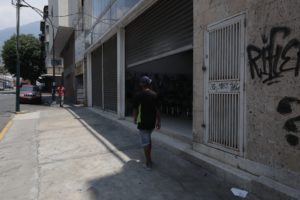Caracas, Mar 26 (EFE).- Electricity supply problems continued on Tuesday in Venezuela, more than 24 hours after the first of two new blackouts that have once again left much of the country in darkness, a situation that motivated the Nicolas Maduro government to extend by another day its suspension of work and school activities.
The two cuts in electricity service are affecting almost the whole country and are once again being blamed by the government on sabotage. The second of them was accompanied by a fire at the Guri hydroelectric plant, the country’s most important energy facility.
In Caracas, business and government services are severely curtailed due to the blackout and there are long lines at the few gasoline stations that have not closed.
 According to Health Minister Carlos Alvarado, “No serious or regrettable incident has been registered” at the country’s hospitals, and he added that the electricity plants are equipped to deal with the second massive power outage in less than a month.
According to Health Minister Carlos Alvarado, “No serious or regrettable incident has been registered” at the country’s hospitals, and he added that the electricity plants are equipped to deal with the second massive power outage in less than a month.
Outside of Caracas, the blackout is affecting practically the entire country in one way or another.
Anzoategui state Gov. Antonio Barreto Sira told EFE that electric service had been reestablished intermittently in some of the 21 municipalities in the eastern state.
“It’s not complete restoration … The electricity goes out and the water also goes out,” he said, adding that he had activated a contingency plan to guarantee that hospitals will continue to be able to attend to patients.
Miranda state Gov. Hector Rodriguez said on Twitter that at 1:30 pm power had been restored 90 percent in some areas but only 10 percent in others.
Tachira state Gov. Laidy Gomez told reporters that most of the state bordering on Colombia had been without electricity for 25 hours.
“In addition, we have a collapse of public services, there’s no public transport,” she said, adding that there are sectors where it’s been three months since water has been running through the pipes.
Zulia Gov. Omar Prieto told state-run VTV television that he had activated a contingency plan for the oil-rich region.
The state has also implemented a plan “to guarantee lives and property” after the wave of looting the state experienced in early March during the earlier blackout, when hundreds of businesses were stripped of their wares and about 1,000 people were arrested.
 A government official in Nueva Esparta state told EFE that since Monday the region has experienced at least three blackouts that have lasted about six hours.
A government official in Nueva Esparta state told EFE that since Monday the region has experienced at least three blackouts that have lasted about six hours.
Business activities in all Venezuelan states have been reduced – by 80 percent in some cases – and stores and restaurants that have opted to remain open are taking payment only in US dollars or other foreign currencies.
The speaker of the opposition-controlled National Assembly, Juan Guaido, said that President Nicolas Maduro’s government did not have a “sensible, credible explanation” of the blackout, which comes two weeks after the restoration of power following a nationwide outage that last five days.
Guaido, recognized by roughly 50 countries as Venezuela’s acting president, said during a legislative session that the power failure was a “product of poor maintenance, product of corruption.”
“They lie to avoid taking responsibility for this murderous crisis. They are also risking the little that’s left of the national electrical infrastructure,” Guaido tweeted earlier Tuesday.
Maduro’s leftist government attributed the March 7-12 blackout to cyber-sabotage of the computer system at the Guri hydroelectric complex.
The sabotage was carried out by the United States, the government said.
The opposition, however, blamed the Maduro government for failures in the system, saying that the government’s poor management of the grid was the real cause of the outage.
Fifteen people undergoing treatment in Venezuelan hospitals during the March 7-12 outage died due to the lack of electricity, the opposition said, while officials maintain that two people died.
Washington was the first country to recognize Guaido as interim president and has ratcheted up its economic sanctions against Venezuela since the opposition leader’s Jan. 23 proclamation.
